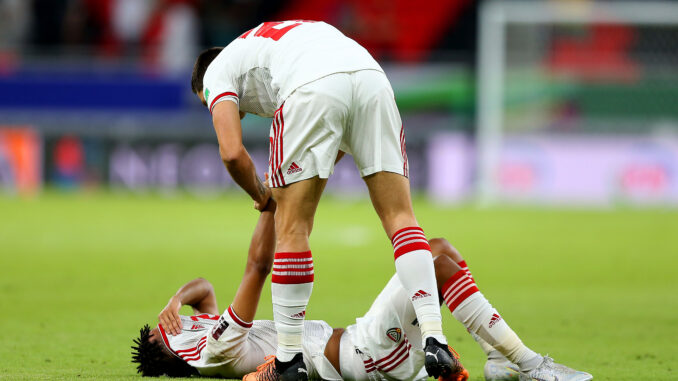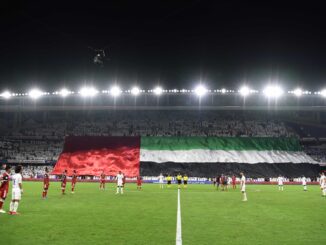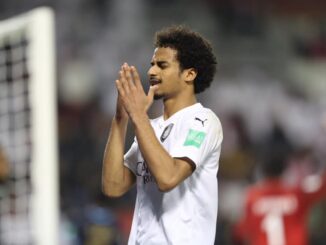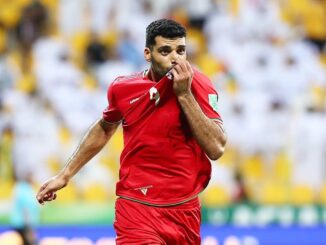
Everyone in Asian football has a vision.
Japan has their 100-year vision, often held up as the blueprint for strategic planning in Asia. India recently launched their new Vision 2047, a 25-year plan to completely overhaul and transform their football ecosystem.
Saudi Arabia has a vision, one closely aligned to the country’s Vision 2030 to reshape the entire country’s economy. It’s where a player like Cristiano Ronaldo fits into the equation.
Everyone, it seems, has a vision. Well, almost everyone.
What about the UAE? What is their vision?
On paper they too have a vision – “Football Strategy – Vision 2038” to be exact. But in practice, it appears to be another costly box ticking exercise with little evidence of any coherent plan or structures in place for the development of the game.
For a nation that has so successfully reimagined its future over the past few decades, and with its own vision for what the next evolution of that journey looks like, its football lurches deeper into a black hole.
While qualifying for the World Cup qualifying playoff against Australia gave the illusion of success, the fact remains it was still a miserable campaign from a side that churned through five coaches in the process.
Finishing the campaign under Argentina Rodolfo Arruabarrena, there were the smallest green shoots from a campaign that yielded just three wins from ten matches in the final round and a paltry return of just seven goals. The only points taken against either of the top two (Iran and Korea) came in the final game against a Korean side that had already sealed qualification and thus had nothing to play for.
But any hope that was garnered from the win over Korea and impressive showing against Australia has long since evaporated, with The Whites dumped from this year’s Gulf Cup without winning a single game – the first time since 2004 that they’ve gone winless at their regional showpiece.
The reaction has been swift and fierce, with leading voices in the Emirates either calling for Arruabarrena to resign or for a complete overhaul of the UAE Football Association.
Legendary commentator Adnan Hamad, whose utterance of “Anwar Roma” when the Emirates qualified for Italia 1990 has become the stuff of legend – and the title for a feature documentary – was scathing in his assessment.
“Emirates football has become a disease that we suffer from at every turn for a decade, and we are still searching for a way,” he said on on Dubai Sports TV’s ‘The Gulf Platform’ after their Gulf Cup campaign ended without a win.
“We ask those in charge of the game, what next? what are you waiting for? What are you doing?”
“Emirates football is now in need of change, not just a coach replacement, or even the resignation of a board of directors, or placing responsibility on one player or a group of players. Emirates football is going into the abyss.
“There is no one who hears or is convinced that we will not rise without change. Emirates football needs a comprehensive change from the base to the top of the pyramid. It needs a strategy from the field, not a paper that costs a six-zero figure that we celebrate from the highest point in the frame.”
That last point being a not-too-subtle dig at their so-called Vision 2038, launched 18 months ago at a lavish ceremony atop the iconic Dubai Frame.
As if to highlight its failings, at around the same time they launched their Vision 2038 they also created an internal strategy department to bring the document to life. The Asian Game has learned that 18 months on that department consists of just one single employee.
Symptomatic of the decay rotting away at Emirati football is the public in-fighting between coach Arruabarrena and star player Ali Mabkhout, who was a surprise omission from the recent Gulf Cup squad.
The Argentine was at pains to point out he had done so for “tactical” reasons, but changed tact after the tournament to claim their all-time leading goal scorer had in fact been dropped for disciplinary reasons.
“Missing five key players was one of the reasons we didn’t do so well at the Gulf Cup,” he explained. “Mabkhout was excluded for disciplinary reasons. Against Argentina he lacked the effort and against Kazakhstan he refused to warm up when asked to.”
As is the way these days, Mabkhout quickly shot back on social media, denying the claims put forward by his coach.
“I have to clarify some points:,” he shared on an Instagram story.
“1. Neither the coach nor anyone at the FA has spoken to me about any issues with my performances to improve.
“2. Against Kazakhstan, the coach never asked me to warm up.
“3. After the Kazakhstan match, I had a friendly conversation with the coach. So he could have spoken to me about that alleged incident then.
“4. The coach mentioned several times that my exclusion was a tactical decision and I respected that. Why change the story now?
“At the end, I’m always ready to serve my country. If I was successful, thank God. If I failed, I won’t blame it on others.”
The spat only adds to the sorry state of Emirati football.
One man who has seen the best and worst of Emirati football over a career spanning more than 30 years is former UAEFA president Yousuf Al-Serkal.
Speaking exclusively to The Asian Game, the former AFC vice president, who served two terms as UAEFA president, slammed the current state of Emirati football.
“We are now living the worst situation in football, to be honest.” he said from his home in Dubai.
“I have been involved with Emirati football since 1990. I started when we qualified to the World Cup in Italy, as a general secretary…until I became the president of UAE Football Federation for two terms.
“I haven’t experienced, or I haven’t seen, the standard of football this bad. As a national team, as youth teams, as clubs, of course, because the result of the national team comes from the club’s standard; I think this is the worst football standard in UAE since I’ve known UAE football.”
The Beginning of the End
For all the dark skies hanging over Emirati football at the moment, it feels like only yesterday that The Whites were considered the Next Big Thing in Asian football, which culminated in their run to the semi-final of the AFC Asian Cup in Australia in 2015.
Under homegrown coach Mahdi Ali, this ‘Golden Generation’ of Emirati football – headlined by Omar Abdulrahman, Ali Mabkhout and Ahmed Khalil – were a breath of fresh air within Asian football.
With Japan, South Korea, Australia and Iran seemingly having a lock on Asia’s four automatic qualifying berths for the World Cup, the arrival of the UAE represented a serious challenge to the established order, especially after their penalty shootout victory over Japan in the quarter-finals of the Asian Cup in Sydney.
That moment, with Keisuke Honda skying his penalty while Abdulrahman coolly slotted a Panenka, felt like a changing of the guard; Asia had a new ‘it’ boy in Abdulrahman and the UAE.
If not already after their exploits in Australia, their arrival seemed genuine when they came from behind to defeat Japan 2-1 at Saitama Stadium to open the final round of World Cup qualifying for Russia 2018. A first World Cup appearance since 1990 appeared not just possible, but increasingly likely.
With the benefit of hindsight we know that not to be the case. Far from being the launching pad for even greater feats, that win over Japan was the peak. They won just two of their next six, losing at home to both Australia and Japan, while Mahdi Ali departed abruptly after a 2-0 loss to Australia in Sydney in early 2017, just six months on from masterminding that famous victory in Japan.
While they again made the semi-finals of the Asian Cup, this time on home soil in 2019, the results on paper told a different story as that on the pitch. This was clearly a side that was in regression and results since then have only validated that.
“Despite relatively maintaining their place in (the) FIFA ranking and making another Asian Cup semi-final, the years since 2015 were characterised by a lack of direction and strategy,” Middle East football expert Wael Jabir told The Asian Game.
“The kind of stability and long-term thinking seen under Mahdi Ali which produced a golden generation does not seem to exist anymore.
“Six managers from six different countries in six years and no clear criteria in the selection process and no consistent tactical approach meant that the team lacked continuity, while there was a distinct indecisiveness in terms of pursuing a generational shift or sticking to experienced faces in order to deliver instant results.
“All these were direct factors behind inconsistent and at times atrocious results on the pitch.”
It needn’t have been like that.
As Al-Serkal explained, after their successful run in Australia in 2015, a plan was put in place to rejuvenate the squad with an eye on 2019, but after he was ousted as federation president in 2016 by Marwan bin Ghalita that plan was thrown out the window.
Embed from Getty Images“By the time we made it to Australia, the team was at its peak,” Al-Serkal recounts.
“But some players at that time needed to be replaced, especially the defenders. Our defensive players were 34 years old and they needed to be replaced.
“In 2016 I had a plan to rebuild the first team with some young players. I had a meeting with our coach, Mahdi Ali, If you recall the name, (and) we agreed to a plan to have our team ready for the 2019 Asian Cup.
“Unfortunately, I left the Federation that year, the new federation that came after me, they wanted to start from zero again, they didn’t want to finish (what we had started).”
That vicious cycle of newly elected Presidents wanting to stamp their imprint on the local game means short-term results are often prioritised over long-term planning. That is how you get, as Jabir explained above, six coaches from six countries in six years.
“Unfortunately, majority of the members of that Federation, they lacked experience,” Al-Serkal said of the regime that replaced his in 2016.
“And then, four years later, they were replaced with new members, totally new members, and the majority of them did not not have experience, unfortunately, including the president of the FA; a promising young man, but still has not the does not have the experience.
“(He) needed some members with him that are experienced to support him, and this is exactly why we lack the experience in the leadership.
Embed from Getty ImagesHe continued: “Also, the team was not supported by young players until a few months ago, and they don’t have the experience now. They still need some time, with proper preparation, with proper friendly matches, more participation and official games, that will take time.
“Our media does not have the patience for time. They started attacking the Federation now and there is a rumour that the Federation again might get replaced.
“So this instability of replacing leadership also has a negative side that does not really support the improvement of the football.”
That scattergun approach, which had become commonplace in the Gulf over the previous few decades, is one that many nations have realised doesn’t bring the stability needed for consistent long-term growth.
Saudi Arabia, under the leadership of Yasser Al-Misehal, have become a beacon of stability within the region. No stranger to that same scattergun approach, after Juan Antonio Pizzi departed after the Asian Cup in 2019, the SAFF identified Herve Renard as his replacement and haven’t looked back with the Frenchman locked in until 2027, which would make him Saudi Arabia’s longest serving manager.
On the back of a successful World Cup campaign, the country is set to host the 2027 AFC Asian Cup, while it is also bidding to host the 2026 Women’s Asian Cup having made significant progress in investing in and developing the women’s game in the country.
Football in the Kingdom is thriving on the back of strong leadership; one with vision, purpose and direction.
The result of that leadership and direction within Saudi Arabia means the country can have, on paper, a poor Gulf Cup campaign and yet not have it turn into an existential crisis. While disappointing, the country is working to a bigger plan and vision which tempers any disappointment that may otherwise exist.
Elsewhere, Qatar mimicked UAE’s successful blueprint with Mahdi Ali, giving Felix Sanchez, who had risen through the ranks with the national youth teams, the job of leading the senior national team to the World Cup.
While results at the World Cup fell a long way short of expectations, there is no doubt their success in winning the Asian Cup was as a result of the stability and direction of the federation over the previous few years.
Bahrain, as detailed by The Asian Game’s Martin Lowe recently, are another quietly developing a sense of stability and direction as Helio Sousa prepares to take the team through another World Cup qualifying campaign, while the same is true in Oman, the real surprise packets in the last round of World Cup qualifying for Qatar 2022, where Branko Ivankovic continues to impress having guided the Sultanate to the Gulf Cup final.
A Nation Divided
Just 140 kilometers, most of it along the vast expanses of Sheikh Zayed Road, separates Dubai from Abu Dhabi. Roughly half way is the imaginary ‘border’ that separates the two emirates; the two main powerful forces among the seven that make up the United Arab Emirates.
Embed from Getty ImagesBut while there may be no actual border between the two neighbouring emirates and cities, and in theory they are part of the larger collective, in practice the reality is often very different; the two operating almost independently of each other.
For a while, during the height of the COVID-19 pandemic, a hard border did exist between the two, with those entering Abu Dhabi from Dubai required to stop for a mandatory COVID test. The hard border solidified something that has long since been a thing; divergent priorities of Abu Dhabi and Dubai.
The Economist’s Middle East expert, Gregg Carlstrom, wrote at the time:
“The checkpoints are one sign of a sometimes awkward relationship. Dubai is the flashy one of the pair, with its man-made islands and hedonistic hotels. Abu Dhabi is the seat of political power and the country’s oil, but happily keeps a lower profile. True to form, Dubai reopened its economy (and its airport) faster than its neighbour wanted—hence the border.”
He continued: “That will not be the only source of awkwardness. Abu Dhabi is investing heavily in theme parks, a financial sector and a film industry—all of them in direct competition with Dubai’s. Meanwhile the UAE’s increasingly assertive foreign policy, run from Abu Dhabi, will rankle Dubai: tensions with Turkey and Iran are bad for business. Those border checkpoints will come down in 2021. But the relationship between the two emirates will be fraught for other reasons.”
Perhaps the best example of their independent interests is their respective international airlines, Emirates (based out of Dubai) and Etihad (based out of Abu Dhabi). While it’s not unusual for a country to have more than one carrier, in the Gulf where state-owned airlines are a symbol of status and prestige, having two seems excessive, especially in a country so small.
But it speaks to the internal politics and power plays within the UAE, where each emirate’s desire to promote themselves conflicts with any notion of unity.
Take Formula 1, for example. The season-ending race is held in Abu Dhabi and it is titled as such. Whereas almost every other race on the calendar is branded with the name of the host country, including those in neighbouring Saudi Arabia, Bahrain and Qatar, the season ending spectacular is not known as the UAE Grand Prix, but rather the Abu Dhabi Grand Prix.
The entire event is a marketing exercise for Abu Dhabi and its commercial interests, namely Etihad Airways. The same is true for events in Dubai that look to capitalise on the city’s global reputation and brand.
Embed from Getty ImagesWhen it comes to the development of sport, the divide manifests in other ways, with each emirate having their own powerful Sports Council – the Abu Dhabi Sports Council and Dubai Sports Council – working to further their own interests, and while often that can be to the advantage of the UAE and its sports industry, often they are two trains on very divergent tracks.
“The vision and unity of purpose seen in Saudi Arabia is something that is lacking in UAE football,” Jabir explained.
“Between the UAE Pro League, the FA and the local Sports Councils, there are too many different and often conflicting interests, and as a result each of those entities is pulling in a different direction and utilising its resources in pursuit of its own goals, rather than towards the best interests of UAE football.
“Similarly, the competition and rift between the FA and the Pro League often manifests itself in the form of decisions driven by hunger for power and personal interests ahead of the common good of the game.”
The fact the UAEFA is based in Dubai while the Pro League is in Abu Dhabi simply amplifies and exacerbates the rift that exists between them.
Al-Serkal has plenty of experience in dealing with these all-powerful Sports Councils, and explains the influential and often interfering role they play in the local football scene.
“Those Councils did not exist until later years,” he explained.
“So we did work as one country, (with) one goal for the football. Once those councils were created, and they gained the strength, (the) financial strength… because they are the ones who are granting the money.
“The government money comes through them to the clubs, so they they (have an) effect on the club’s. In FIFA it’s it’s illegal that one identity own (multiple) clubs that participate in a league, and okay, the Councils don’t own the clubs, but somehow they influence the club’s on their decisions. So this is unfortunate, honestly.”
He continued: “They don’t interfere directly, but they have the influence over the Federation, and this does not really help because interference from outside affects negatively. The government has to correct this.
“I keep telling my friends here, regardless who became becomes the the President, if the new president is a strong personality, the Councils will work against him (and) not support him. If (he’s) not a strong personality, they will interfere and influence on his work.
“As long as this goes on, I don’t think we will improve.”
Listen to the latest The Asian Game Podcast




